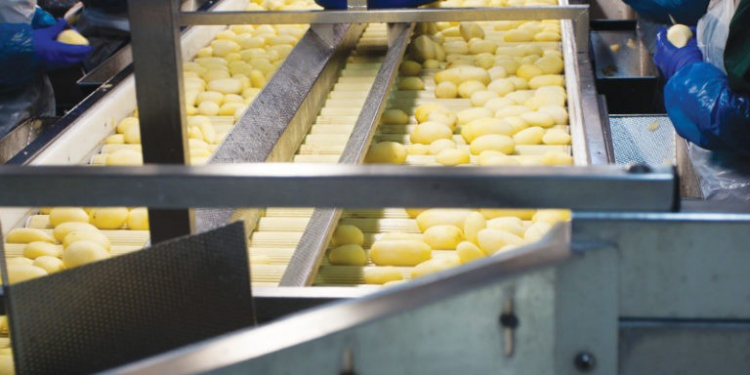How potatoes are treated during the washing process is crucial for the fresh pack and particularly for small and fragile specialty products.
Tummers is known for its high capacity and accurate destoning and washing equipment, which are commonly used in the potato processing factories. From the company’s area of expertise, the focus is mainly on technical improvements, in order to guarantee around the clock working environment which eliminates the unforeseen downtime, during production hours.
Testing and Adapting
It is generally thought that industrial washers are too rough on the product and can cause bruising and damage of the potatoes, however Tummers has proven the opposite. Based on the company’s ongoing research in optimizing the quality within the processing area, we felt the need to also investigate what impact our equipment had on the potato. During recent years, we have gathered a lot of data about this aspect, especially on large washing lines. To achieve this, we used a potato dummy with a mobile data-logger inside. This way, we could observe where the critical handling points were and where improvements needed to be made. These tests were performed on several production sites, in order to get the complete picture under different circumstances, because the demands of the specialty products are different from those of the industrial market. These tests gave us a clear view on the process and handling of potatoes in our equipment.Based on this analysis we made some minor adjustments to fulfil the needs in the Fresh pack industry.
Minor Adjustments
With these modifications we are able to provide an optimal solution to the customers in the fresh pack industry. This resulted in our latest washing line, delivered to a major Fresh pack supplier in France, for very fragile and small delicacy potato called “La Ratte”. These potatoes have a diameter of ø10mm up ø70 mm. The washing line is using our standard type of destining, washing and drying equipment, with small optimizations and a special focus on gentle fall movement. Transport is ensured via water flumes and we have managed to minimalize transfers to different steps in the line, thus allowing for great quality on destoning, washing inspection and drying.
Challenges – then and now
The most challenging aspect encountered when researching and developing optimizations to the washing line was the manner in which the potato needs to be treated, namely as delicate as possible, but at the same time in a way which allows you to work with high capacities.
Looking back at the past 10 years, we have seen a lot of developments in sustainability and investments made in this area. Also, compared to a decade ago, customers choose better quality machinery which has longer durability, while at the same time they require to produce continuously and therefore reduce the costs associated with the process.
You can read more on this topic in our print magazine Potato Processing International (July/Aug 2016)!







